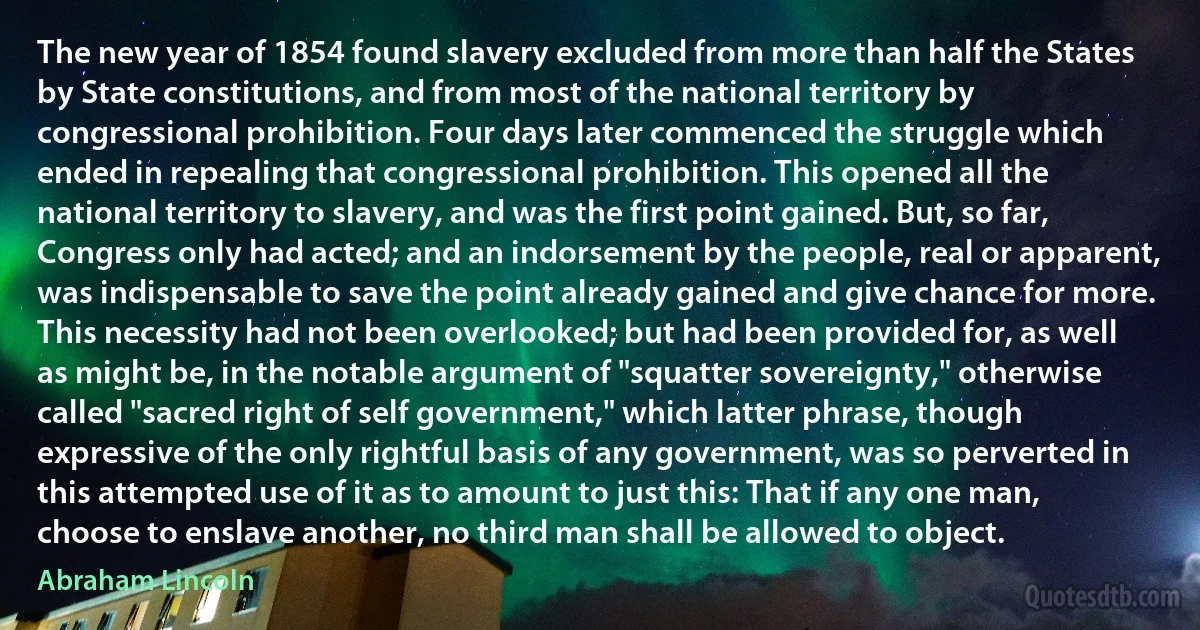Self Quotes - page 93
There is a price to be paid even for fellow-traveling with a racial identity as politicized and demanding as today's black identity. This identity wants to take over a greater proportion of the self than other racial identities do. It wants to have its collective truth-its defining ideas of grievance and protest-become personal truth.... These are the identity pressures that Barack Obama lives within. He is vulnerable to them because he has hungered for a transparent black identity much of his life. He needs to 'be black.' And this hunger-no matter how understandable it may be-means that he is not in a position to reject the political liberalism inherent in his racial identity. For Obama liberalism is blackness.

Shelby Steele
Nothing can stir the "depths" of mind, but total out-of-doors. We call "depth," last dregs, etc., that in man which only ultimate facts and happenings can interest; that which the near and usual can neither rouse nor ruffle. Somewhere in each man, we imagine, there lies an ultimatum, to be backed by all his energies from all reservoirs, ordinary and extraordinary,--what can elicit from any man such ultimatum and ultimatum-backing?--nothing that has not somewhere in it the word All! There are such things, we think, as ruling passions, "deepest desires," in any man some nameable or unnameable last ambition--what can set such a depth on fire?--nothing but some total opportunity (real or believed real), discovered in the wide world beyond the self.

William Ernest Hocking
That which enables man to have a real relation to truth and which removes his temptation to lie, must be something independent of all time, something absolutely unchangeable, which as faithfully reproduces the old as if it were new, because it is permanent itself; it can only be that source in which all discrete experiences unite and which creates from the first a continuous existence. It is what produces the feeling of responsibility which oppresses all men, young and old, as to their actions, which makes them know that they are responsible, which leads to the phenomena of repentance and consciousness of sin, which calls to account before an eternal and ever present self things that are long past, its judgment being subtler and more comprehensive than that of any court of law or of the laws of society, and which is exerted by the individual himself quite independently of all social codes (so condemning the moral psychology which would derive morality from the social life of man).

Otto Weininger
What needs my Shakespear for his honour'd Bones,
The labour of an age in piled Stones,
Or that his hallow'd reliques should be hid
Under a Star-ypointing Pyramid?
Dear son of memory, great heir of Fame,
What need'st thou such weak witnes of thy name?
Thou in our wonder and astonishment
Hast built thy self a live-long Monument.
For whilst to th' shame of slow-endeavouring art,
Thy easie numbers flow, and that each heart
Hath from the leaves of thy unvalu'd Book,
Those Delphick lines with deep impression took,
Then thou our fancy of it self bereaving...

John Milton
Pettiness separates; breadth unites. Let us be broad and big. Let us not overlook vital things because of the bulk of trifles confronting us. A true conception of the relation of the sexes will not admit of conqueror and conquered; it knows of but one great thing: to give of one's self boundlessly, in order to find one's self richer, deeper, better. That alone can fill the emptiness, and transform the tragedy of woman's emancipation into joy, limitless joy.

Emma Goldman
Now one will inevitably raise the question: How then do we conquer self-centeredness? How do we get away from this thing that we call self-centeredness? How can we live in this universe with a balance and with a type of perspective that keeps us going smoothly and we are not too absorbed in self? How do we do it?

Martin Luther King Jr.
If you're coming into this YouTube thing, do it because of what you can do for other people... Don't worry so much about yourself, and if you're doing ok, and if you love yourself - you do, trust me. Think of what you can do for other people... Not some kind of self review, not some kind of day or week or however long to make sure you feel good about yourself - but thinking about the other people all around you, all the time, who could always - always use a hand, one way or another, even if it's kindness. Think of that instead. And maybe you are starting to notice my quote on the page "Look without, and you will be fulfilled within - without a doubt." I really mean that - look without, without of yourself - not within.

Ysabella Brave
From the early great Upanishads, the recognition ATHMAN = BRAHMAN (the personal self equals the omnipresent, all-comprehending eternal self) was in Indian thought considered, far from being blasphemous, to represent the quintessence of deepest insight into the happenings of the world. The striving of all the scholars of Vedanta was, after having learnt to pronounce with their lips, really to assimilate in their minds this grandest of all thoughts.

Erwin Schrödinger
Descartes, I think, broke with this when he said, "To accede to truth, it suffices that I be any subject that can see what is evident." Evidence is substituted for ascesis at the point where the relationship to the self intersects the relationship to others and the world. The relationship to the self no longer needs to be ascetic to get into relation to the truth. It suffices that the relationship to the self reveals to me the obvious truth of what I see for me to apprehend the truth definitively. Thus, I can be immoral and know the truth. I believe this is an idea that, more or less explicitly, was rejected by all previous culture. Before Descartes, one could not be impure, immoral, and know the truth. With Descartes, direct evidence is enough. After Descartes, we have a nonascetic subject of knowledge. This change makes possible the institutionalization of modern science.

René Descartes
My dear Mr. Morse: It was very pleasant to me to get a letter from you the other day. Perhaps I should have found it pleasanter if I had been able to decipher it. I don't think that I mastered anything beyond the date (which I knew) and the signature (which I guessed at). There's a singular and a perpetual charm in a letter of yours; it never grows old, it never loses its novelty. One can say to one's self every morning: "There's that letter of Morse's. I haven't read it yet. I think I'll take another shy at it to-day, and maybe I shall be able in the course of a few years to make out what he means by those t's that look like w's and those i's that haven't any eyebrows." Other letters are read and thrown away and forgotten, but yours are kept forever-unread. One of them will last a reasonable man a lifetime.

Thomas Bailey Aldrich
When the happiness or misery of others depends in any respect upon our conduct, we dare not, as self–love might suggest to us, prefer the interest of one to that of many. The man within immediately calls to us, that we value ourselves too much and other people too little, and that, by doing so, we render ourselves the proper object of the contempt and indignation of our brethren. Neither is this sentiment confined to men of extraordinary magnanimity and virtue. It is deeply impressed upon every tolerably good soldier, who feels that he would become the scorn of his companions, if he could be supposed capable of shrinking from danger, or of hesitating, either to expose or to throw away his life, when the good of the service required it.

Adam Smith


